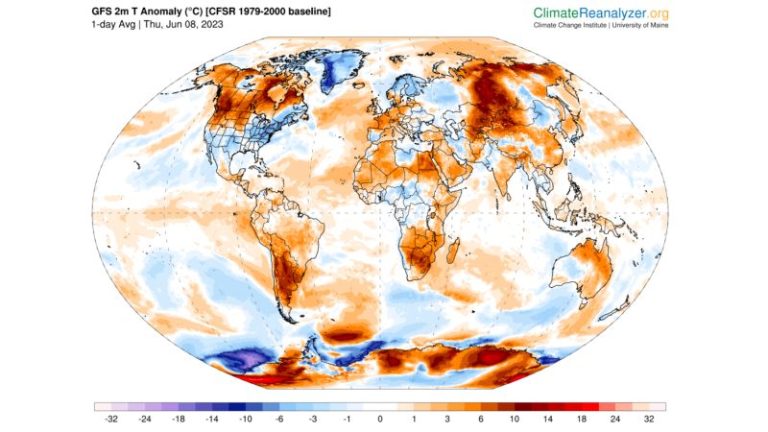Dozens of heat records have fallen in Siberia, as temperatures climbed above 100 degrees Fahrenheit (37.7 Celsius).
Despite only being early June, records are tumbling across parts of Siberia as extreme heat pushes into unusually high latitudes.
Last Saturday, temperatures reached 37.9 degrees Celsius (100.2 Fahrenheit) in Jalturovosk, its hottest day in history, according to the climatologist Maximiliano Herrera, who tracks extreme temperatures across the globe.
A slew of temperature records have fallen in Siberia since then.
Several all-time heat records were broken on Wednesday, including in Baevo, which reached 39.6 degrees Celsius (103.3 Fahrenheit), and Barnaul, which hit 38.5 degrees Celsius (101.3 Fahrenheit).
Yet another brutally hot day in Asia with 47C in China and 39C in Siberia where more records fell:
all time
38.0 Zdvinsk
35.6 Tomsk tie
monthly
38.2 Kupino
36.7 Kolyvan
36.3 Ermakovskoe
35.3 Tastyp
In India Highlands
29.9C Cherrapunji new monthly record pic.twitter.com/f2fY77AH6z
— Extreme Temperatures Around The World (@extremetemps) June 8, 2023
A scientific analysis may be done to asses how much influence climate change is having on this event, but we know that global warming is causing more extreme temperatures, especially in the higher latitudes.
A particularly intense and prolonged heat wave in 2020, which saw the Arctic Siberian town of Verkhoyansk hit 100.4 degrees Fahrenheit (38 Celsius), would have been “almost impossible” without human-caused climate change, an analysis by a team of international scientists found.
Siberia tends to see large monthly and yearly temperature fluctuations, but the last few decades have seen a strong warming trend.
As wildfire season takes hold in the Northern Hemisphere, Siberia – along with Canada – has also been grappling with significant and intense wildfires. Fired that raged across Russia’s Ural Mountains in May, killed at least 21 people.
Extreme heat is likely to worsen wildfires.
It’s not just Siberia that has seen record heat this week. It has spread across Central Asia. In early April, Turkmenistan saw temperatures of 42 degrees Celsius (107.6 Fahrenheit), which was “a world record for that latitude,” Herrera said.
Since then the heat hasn’t stopped, with rolling heat waves gripping the region.
On Wednesday, temperatures of more than 45 degrees Celsius (111.2 Fahrenheit) were recorded in China, 43 degrees Celsius (109.4 Fahrenheit) in Uzbekistan and 41 degrees Celsius (105.8) in Kazakhstan.
It’s “a historic heat wave, which is rewriting world climatic history,” Herrera said on Twitter.

